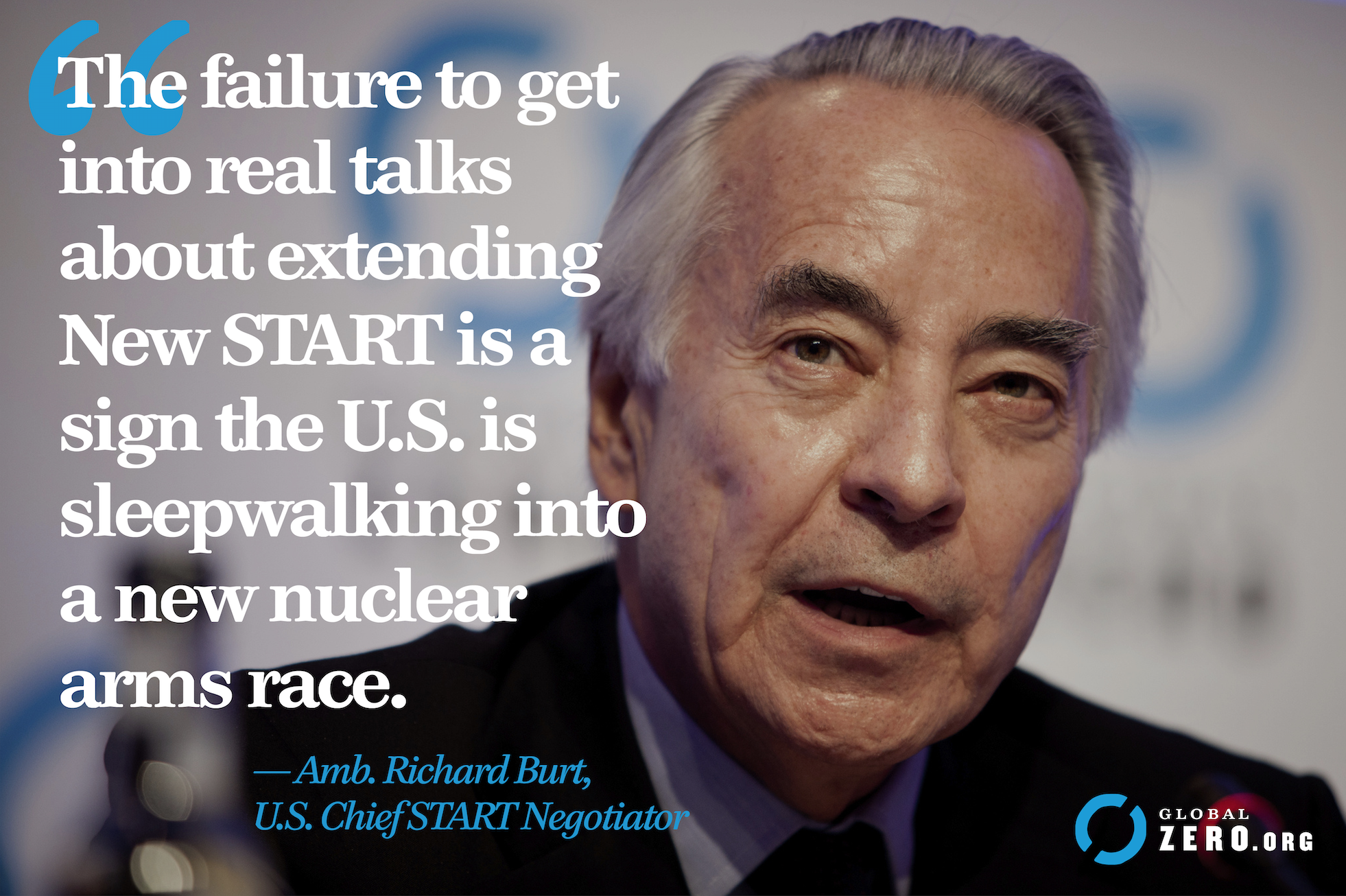U.S. Military and National Security Leaders Support New START
Ten years ago today, U.S. President Barack Obama and Russian President Dmitry Medvedev signed the New Strategic Arms Reduction Treaty (New START), verifiably limiting U.S. and Russian nuclear arsenals. The signing continued decades of arms control cooperation between the world’s two nuclear superpowers, cooperation that is now threatening to unravel. On February 5, 2021, New START — the last remaining U.S.-Russia nuclear arms control agreement — will expire unless extended through a simple agreement signed by both presidents.
To say “extension is a no-brainer” is an understatement. It would lock in verification measures, such as on-site inspections, and limits on strategic weapons until 2026, providing a sturdy foundation for negotiations for a follow-on treaty and engagement with other nuclear-armed states on steps to reduce nuclear risk and work toward the elimination of all nuclear weapons, everywhere. And yet the Trump administration continues to sit in a review process that has already taken years even as the Russians offer to extend without pre-conditions.
New START enjoys strong support not only from the public (82 percent of Americans support extending New START, including 77 percent of Republicans and 89 percent of Democrats), but from current and former U.S. military and government officials and national security experts across the political spectrum. The administration would do well to forgo unrealistic goals and politically-motivated opposition, and extend New START.
Support for New START
“The State Department has affirmed that New START is working and that Russia is complying. NATO will continue to adapt to meet new challenges as it has for 70 years. But we shouldn’t try to fix things that aren’t broken.
The New START Treaty works. It may not be perfect, but it works. Arms control efforts between Russia and the United States should certainly be expanded to include new weapons and rising actors. But to pursue that goal the United States and Europe shouldn’t tear down what’s already in place and holding Russia’s strategic nuclear inventory in check.”
Rep. Eliot L. Engel (D-New York-16)
Chairman of the House Foreign Affairs Committee
Anders Fogh Rasmussen
Fmr. NATO Secretary General,
Medium Op-Ed, March 13, 2020
“And while we should all embrace the goals of constraining Russia’s new weapons systems and including China in a broader arms control framework, it is critical to understand that New START is not an obstacle to achieving these goals. Nor should China’s absence be used as an excuse to oppose New START extension. In fact, it can serve as a springboard for pursuing modernization and deterrence as China’s capabilities mature.
As we think about New START extension in this era of divisive politics, I hope we will all remember what the late Senator Richard Lugar once said:
‘We have the responsibility to ensure that our first impulse in foreign affairs is one of bipartisanship.’”
Sen. Todd Young (R-Indiana)
Member, Senate Committee on Foreign Relations
Richard G. Lugar Lecture, March 6, 2020
“[New START] gives me two very important things. Number one, it puts a limit on the basics of [Russia’s] strategic force. So I understand what their limits are and I can position my force accordingly so I can always be ready to respond.
And maybe as important, it also gives me insight through the verification process of exactly what they’re doing and what those pieces are. Having that insight through my forces and our partners is unbelievably important for me to understand what Russia is doing.”
“I said it multiple times; I’m a big supporter of the New START agreement.”
Gen. John E. Hyten
then-Commander of U.S. Strategic Command
Testimony before HASC, March 1, 2019
“The Joint Chiefs reviewed the components of the [New START] treaty and endorsed it. It is a bilateral, verifiable agreement that gives us some degree of predictability on what our potential adversaries look like.”
Gen. Paul J. Selva
then-Vice Chairman of the Joint Chiefs of Staff
Testimony before HASC, March 8, 2017

Support for U.S. New START ratification in 2010
“As former commanders of Strategic Air Command and U.S. Strategic Command, we collectively spent many years providing oversight, direction and maintenance of U.S. strategic nuclear forces and advising presidents from Ronald Reagan to George W. Bush on strategic nuclear policy. We are writing to express our support for ratification of the New START Treaty. The treaty will enhance American national security in several important ways.”
General Larry Welch (USAF, ret), General John Chain (USAF, ret),
General Lee Butler (USAF, ret), Admiral Henry Chiles (USN, ret),
General Eugene Habiger (USAF, ret), Admiral James Ellis (USN, ret),
and General Bennie Davis (USAF, ret)
Letter to Senate Leaders, July 14, 2010
“We, the undersigned Republicans and Democrats, support the new START treaty because we believe that it:
- Enhances stability, transparency and predictability between the world’s two largest nuclear powers, which together possess about 95 percent of the world’s nuclear weapons
- Contains verification and inspection measures essential to U.S. national security and nuclear threat reduction as it relates to Russia’s strategic nuclear weapons
- Addresses our Nuclear Nonproliferation Treaty (NPT) obligations and therefore assists in gaining cooperation from other countries on key nonproliferation priorities
- Helps strengthen broader U.S.-Russia cooperation, which is important in responding to proliferation challenges from Iran and North Korea
- Does not inhibit our ability to maintain an effective and reliable nuclear arsenal
- Does not constrain our ability to develop and deploy missile defense systems.”
Sec. Colin Powell, Sec. Madeleine Albright, Sec. Frank Carlucci,
and several other prominent national security experts.
Statement Released by Partnership for a Secure America, June 24, 2010